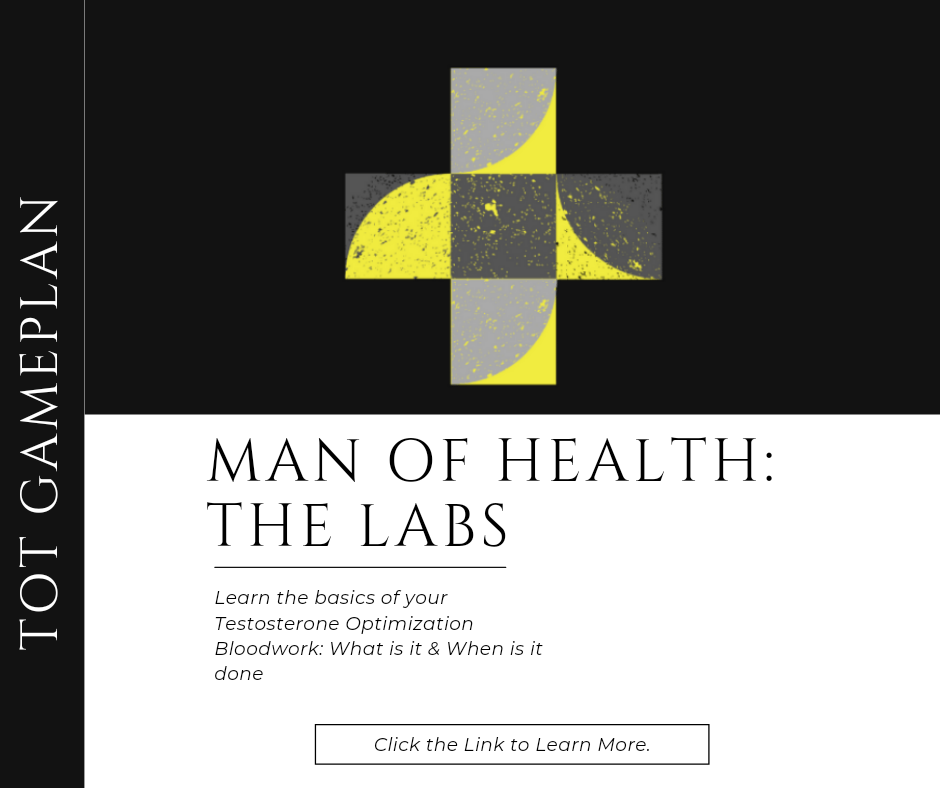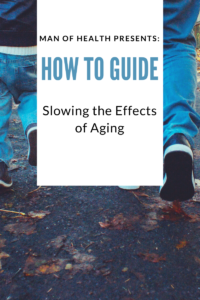Testosterone Therapy Gameplans: What you need to Know?
Testosterone Therapy as you know is a lifelong partnership between you and Man of Health. Our goal is to partner with you to become the best version of yourself.
In the next few paragraphs we will breakdown the labs that are done when starting a TOT (Testosterone Optimization Therapy) Gameplan.
BLOODWORK
We at Man of Health believe it is important to have routine bloodwork done. It is vital to know exactly what the bloodwork means. We typically do an initial blood panel before starting, bloodwork 4-6 weeks after starting, and then bloodwork 2-3x a year going forward. (This can be less or more often depending on the patient). Let’s discuss some of the bloodwork we order on our patients. Ever panel we discuss may not be ordered for you, but this is a simple reference for you. Remember the provider will personalize your levels to your health gameplan.
Total Testosterone: 600-1200, We like to keep most of our guys between these levels. Here at Man of Health we treat your symptoms not the numbers. The lab values are used as a reference range and to make adjustments if needed. When levels exceed 1500, we have noticed an increase in hematocrit, lower HDL, and other side effects. We typically make adjustments to dosage or frequency.
Free Testosterone (Greater than 2% of Total T): This is a more accurate indicator of testosterone levels in men. It should be greater than 2% of your total testosterone. Most of your total testosterone is bound to protein (98%). The other 2% is free to give the body what it needs. If your Free T is less than 2% we may order a SHBG. If your SHBG is low could be a sign of diabetes.
SHBG (Sex Hormone Binding Globulin): SHBG is created by the liver and binds to total testosterone preventing it from being free. Remember Free Testosterone is what the body actually uses. Most younger men have 60% of the testosterone bound by SHBG. This number increases as we age naturally.
CBC (complete blood count): We test at initial, follow up 4-6 weeks. We typically check this twice per year. We are specifically looking at your hemoglobin and hematocrit, which we will discuss next.
Hemoglobin & Hematocrit: is called H & H, which is part of your overall blood count. We tend to want your numbers below 18 (hemoglobin) and 53% (hematocrit). If your levels are high in either or both it could be a sign of erythrocytosis (body producing too many red blood cells). We recommend blood donation to help alleviate the issue if symptomatic. We will also make adjustments to medications. Checked 2-3x a year.
CMP (Comprehensive Metabolic Panel): Checked at initial. We are specifically looking at kidney and liver function. Some of the medications and supplements you take in can affect your kidneys and liver. We are looking to ensure whatever your taking into your body, you can breakdown, and excrete it. After the initial CMP we will check this annually at the beginning of the year..
Lipid panel: We are looking at your cholesterol, LDL (“bad cholesterol”), your HDL (because testosterone can lower this we want to take a monitor it). We will take a look at the initial bloodwork and then twice during the 1st year. Then once per year.
PSA (prostate specific antigen): Baseline bloodwork, 8 weeks after start, then yearly. PSA levels should remain below 4. We may check it more frequently if you decide to do transdermal cream. (Research is showing that cream does not cause prostate cancer). If your PSA is greater than 4 we will not start TOT.
TSH Thyroid Stimulating Hormone: (Weight Loss Patients): We want to see your TSH less than 2.5. If it is high we may order more testing (T3 & T4). The thyroid can cause weight gain or weight loss depending on function. We check it on initial weight loss panel and 1-2 times going forward.
Estradiol: (estrogen level): Initial, 4-6 weeks post start, and 1-2 times a year going forward. Testosterone must be balanced with estrogen. If your estrogen is high greater than 45 with symptoms. We may start you on an AI (aromatase inhibitor). We will slowly taper you off this medication. If your levels get to low below 15. We will stop aromatase inhibitor and recheck within 2-3 weeks.
Typical Bloodwork schedule for our TOT Patient:
Initial Bloodwork
Follow up 1-2 months
Follow up 2-3 Months
Follow up every 6 Months.
*You may have more frequent bloodwork of adjustments are made in medications*
Typical Bloodwork in our Advance Weight Loss Patients
Initial Bloodwork
Follow up 6 Months
Follow up Annually
Please Learn what each of these values mean, and write down the personal numbers we discuss. We personalize each person’s medications, bloodwork schedule, and ranges. Keep a personal journal of your numbers.
Always talk to your primary care provider before starting any supplement, medication, fitness plan, or nutrition plan. The providers at Man of Health do not practice as your primary care provider.
If you would like to start our Man of Health: TOT GAMEPLAN, or if you have some bloodwork we need to discuss please schedule at the link below
CLICK HERE TO SCHEDULE




